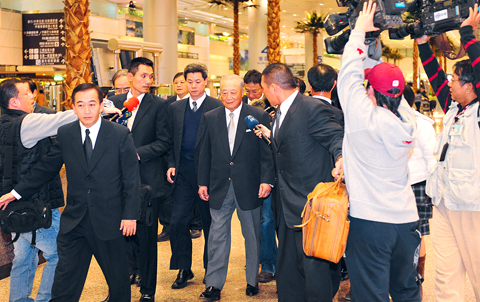Former Chinatrust Financial Holding Co (中信金控) vice chairman Jeffrey Koo Jr (辜仲諒) was released on NT$100 million (US$3 million) bail late on Monday night.
Koo was escorted to the offices of the Supreme Prosecutors Office’s Special Investigation Panel (SIP) on Monday morning after making a surprise return from Japan, where he had been in hiding since evading an arrest warrant that was issued in 2006 after he failed to answer a subpoena to appear in court over allegations of irregularities involving Chinatrust’s bid for rival Mega Financial Holding Co (兆豐金控).
The questioning began at around 11am and lasted for 12 hours.

PHOTO: YAO KAI-SHIOU, TAIPEI TIMES
Koo was also questioned about allegations that he was involved in alleged money-laundering by former president Chen Shui-bian (陳水扁).
Prosecutors decided not to restrict Koo’s movements or bar him from leaving the country.
“Given that he is not likely to flee nor collude with the other suspects, Mr Koo was released on bail,” SIP spokesman Chen Yun-nan (陳雲南) said.
After leaving the SIP offices at around midnight, Koo did not say anything about the investigations, but issued an apology.
“I would like to apologize to the public and to the shareholders of Chinatrust Financial Holding Co for being away over the past two years,” Koo said.
“I would like to help prosecutors conclude their investigation in order to minimize the impact on Chinatrust Financial Holding Co,” he said.
Confirming that SIP Prosecutor Yueh Fang-ju (越方如) flew to Japan last week, Chen would not confirm whether Yueh was sent to persuade Koo to return to Taiwan.
Chen also denied allegations that Koo had returned to Taiwan after being promised that he would not be detained.
“[Yueh] was in Japan last week, but I cannot tell you anything about the purpose of her trip,” Chen said. “I can assure you that we did not trade any promises in return for Koo’s return.”
After learning that his son had returned, Koo’s father, Chinatrust Financial Holding Co president Jeffrey Koo (辜濂松), returned to Taiwan yesterday morning from Lima, Peru, where he had been attending the APEC summit.
Asked for comment about his son, he only said: “Good for him.”

ENDEAVOR MANTA: The ship is programmed to automatically return to its designated home port and would self-destruct if seized by another party The Endeavor Manta, Taiwan’s first military-specification uncrewed surface vehicle (USV) tailor-made to operate in the Taiwan Strait in a bid to bolster the nation’s asymmetric combat capabilities made its first appearance at Kaohsiung’s Singda Harbor yesterday. Taking inspiration from Ukraine’s navy, which is using USVs to force Russia’s Black Sea fleet to take shelter within its own ports, CSBC Taiwan (台灣國際造船) established a research and development unit on USVs last year, CSBC chairman Huang Cheng-hung (黃正弘) said. With the exception of the satellite guidance system and the outboard motors — which were purchased from foreign companies that were not affiliated with Chinese-funded

PERMIT REVOKED: The influencer at a news conference said the National Immigration Agency was infringing on human rights and persecuting Chinese spouses Chinese influencer “Yaya in Taiwan” (亞亞在台灣) yesterday evening voluntarily left Taiwan, despite saying yesterday morning that she had “no intention” of leaving after her residence permit was revoked over her comments on Taiwan being “unified” with China by military force. The Ministry of the Interior yesterday had said that it could forcibly deport the influencer at midnight, but was considering taking a more flexible approach and beginning procedures this morning. The influencer, whose given name is Liu Zhenya (劉振亞), departed on a 8:45pm flight from Taipei International Airport (Songshan airport) to Fuzhou, China. Liu held a news conference at the airport at 7pm,

AIR SUPPORT: The Ministry of National Defense thanked the US for the delivery, adding that it was an indicator of the White House’s commitment to the Taiwan Relations Act Deputy Minister of National Defense Po Horng-huei (柏鴻輝) and Representative to the US Alexander Yui on Friday attended a delivery ceremony for the first of Taiwan’s long-awaited 66 F-16C/D Block 70 jets at a Lockheed Martin Corp factory in Greenville, South Carolina. “We are so proud to be the global home of the F-16 and to support Taiwan’s air defense capabilities,” US Representative William Timmons wrote on X, alongside a photograph of Taiwanese and US officials at the event. The F-16C/D Block 70 jets Taiwan ordered have the same capabilities as aircraft that had been upgraded to F-16Vs. The batch of Lockheed Martin

GRIDLOCK: The National Fire Agency’s Special Search and Rescue team is on standby to travel to the countries to help out with the rescue effort A powerful earthquake rocked Myanmar and neighboring Thailand yesterday, killing at least three people in Bangkok and burying dozens when a high-rise building under construction collapsed. Footage shared on social media from Myanmar’s second-largest city showed widespread destruction, raising fears that many were trapped under the rubble or killed. The magnitude 7.7 earthquake, with an epicenter near Mandalay in Myanmar, struck at midday and was followed by a strong magnitude 6.4 aftershock. The extent of death, injury and destruction — especially in Myanmar, which is embroiled in a civil war and where information is tightly controlled at the best of times —